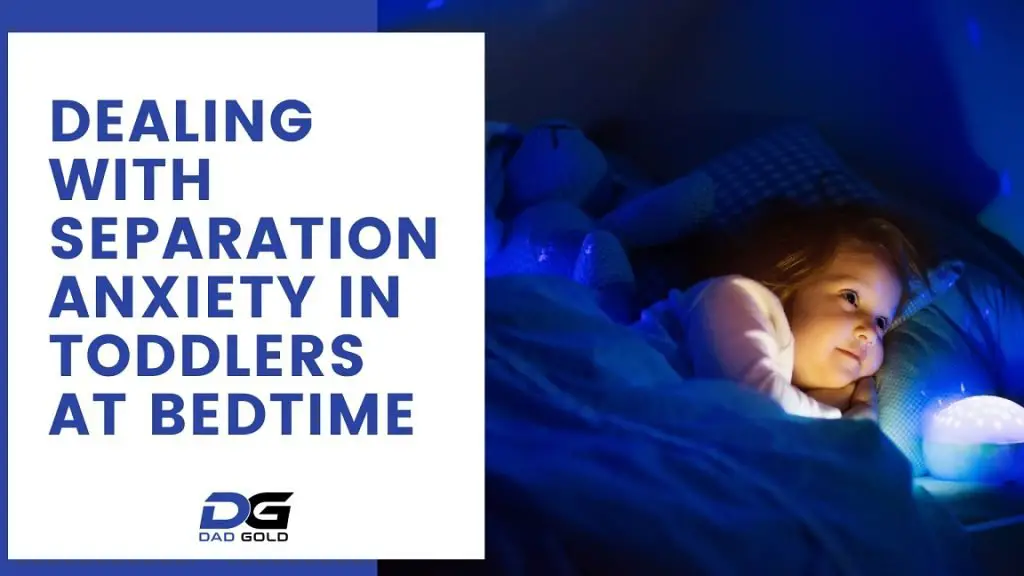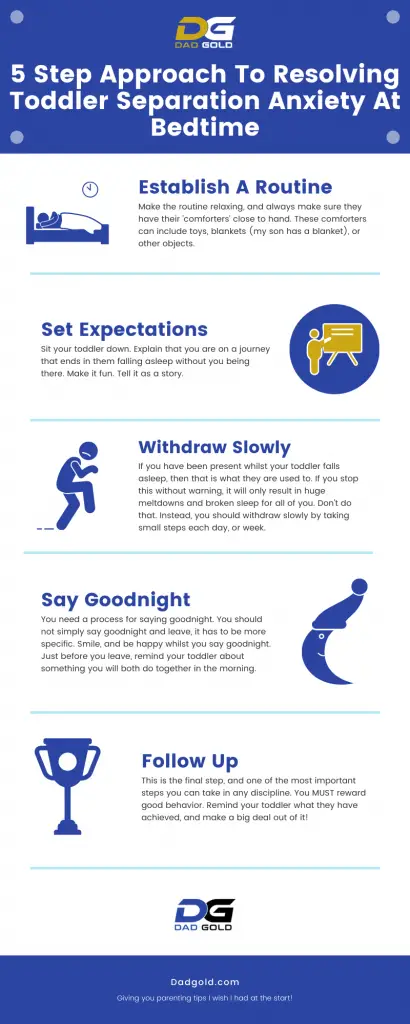It is when you start to get your adult life back again!
That magical time of the day when your toddler is asleep, and you can get some adult stuff done.
Suddenly, your toddler doesn’t want to go to sleep without you. How did that happen?
Now you’ve got to spend 30 minutes of your precious time settling your toddler until they are asleep! What you need is to understand separation anxiety in toddlers at bedtime.
In this post, we cover that topic.
Not only does this cause your toddler to fight sleep, but there are also other signs of separation anxiety in toddlers, such as the following sleep disturbances:
- Waking up multiple times during the night
- Waking up crying in the morning
- They want to sleep in your bed every night

5 Reasons Why Your Toddler May Have Seperation Anxiety At Bedtime
Growing Bond
Separation anxiety in toddlers at bedtime can be good news! It means that your toddler is beginning to feel a powerful bond between you both.
A strong bond is very important between a parent and a child.
The stronger bond between you both means they are less likely to want to let you go, especially at bedtime!
Dependency Highlighted
Another reason for this nighttime separation anxiety is that your toddler may have started to realize how important you are to their life.
They rely on you! They have done since birth, they just didn’t realize it.
Now, they realize that they are entirely dependent upon you, which may result in them wanting to be around you all the time.
Life Changes
Has your toddler recently started kindergarten? Have you changed their babysitter? Is someone new looking after them?
These are huge life changes for a toddler. It may increase your toddler’s separation anxiety because you are now leaving them at kindergarten, or with someone new.
The good news is that it doesn’t take long for a toddler to get used to the changes. Instead, you need to ride it out.
More Scared
Now that your little one is a toddler, they start to get more interested in what you are doing or watching.
Gone are the days when you could put anything on TV, and they wouldn’t understand or care what was happening. Now they pay attention!
Depending on what you watch, your toddler may experience fear of other things for the first time! Experts suggest that we are born with only two fears, falling and loud noises. Fear of other things is learned behavior.
This new fear could cause separation anxiety in toddlers at bedtime. If your toddler is scared, then you should address this.
Pushing Limits
It could be that your toddler is just pushing your limits! You know what these toddlers are like. They forever see how far they can push you before you explode!
If it is this, you need to stay firm!
5 Step Approach To Resolving Toddler Separation Anxiety At Bedtime

Establish A Routine
The first step is to establish a bedtime routine! Without this, you are fighting a losing battle.
Make the routine relaxing, and ensure they have their ‘comforters’ close to hand. These comforters can include toys, blankets (my son has a blanket), or other objects.
Before you even begin to battle the separation anxiety, you must first have a routine. Kids love a routine!
Using a night light projector (with music) is an excellent part of the routine! I switch it on just before I leave the room now.
Set Expectations
- Sit your toddler down.
- Explain that you are on a journey that ends in them falling asleep without you being there. Make it fun, and make it a story.
- Tell your toddler that this is a fun journey and is part of growing up.
- Tell your toddler it is OK to fail now and again, as long as you both achieve the goal.
- Drive the point home that they will eventually be falling asleep on their own.
That will set your toddler’s expectations. Your job is to ensure that you do not deviate from the plan!
Withdraw Slowly
If you have been present when your toddler falls asleep, that is what they are used to. If you stop this without warning, it will only result in massive meltdowns and broken sleep for all of you. Don’t do that. Instead, you should withdraw slowly.
When my son started to have separation anxiety at bedtime, it was straight after a vacation where he slept in the same bed as us for two weeks. We got back home, and he was no longer able to fall asleep on his own.
I stayed in his bed for 4 nights before moving to the floor next to his bed. Then, I moved outside his bedroom, where he could still see me through the door. Then I moved away from his view but was still there for him to speak to me if needed. After this, I put him to bed alone, said goodnight, and left. There were times when he wasn’t happy, but I stuck to the plan, and it worked.
Say Goodnight
You need a process for saying goodnight and not saying goodnight and leaving; it has to be more specific.
Here is the process:
- Let your toddler know that you will read a story, then you will say goodnight and will leave.
- Read a story, say goodnight, remind your toddler about something you will do in the morning, then leave.
By reminding your toddler about something you will do with them tomorrow, it leaves them with the thought that you will be together again in the morning. Something simple like ‘hey, when you wake up in the morning we can have breakfast together’.
Don’t forget to smile and be happy when saying goodnight. If you look upset, scared, or unhappy, it will remind your toddler that being alone at bedtime is upsetting.
Follow Up
This is the final step and one of the most important steps you can take in any discipline. You MUST reward good behavior.
By rewarding good behavior, you embed that excellent behavior as something positive. It doesn’t have to be financial like ‘we will get you a new toy.’ It can be something simple like a star on a chart every time your toddler falls asleep.
Kids love to be rewarded! It is your job to use it to your advantage!
Frequently Asked Questions
How long should you leave a toddler to cry at bedtime?
It is difficult because the longer you leave it, the worse their bedtime memory becomes. On the other hand, you can’t be seen as someone who goes to check on them every minute. They will take advantage! I would go in every 5 minutes, but I will only stay for around 20 seconds. Settle quickly, then leave.
Is it OK to let toddlers cry themselves to sleep?
I prefer not to do this because it will make them anxious every bedtime. You should find out why they need to cry before going to sleep. Is it separation anxiety or another reason? Find out, and then address that problem. Make bedtime fun! Don’t forget to smile! Parenting is fun.
How long does separation anxiety last in babies at night?
Usually, separation anxiety ends by the time your baby is 2 years old. However, everyone is different! If you feel like it is becoming a problem, you should follow the steps on this page.
Conclusion
Dealing with separation anxiety in toddlers at bedtime is a challenge that takes time, patience, and reward when they get it right!
You must stick with it for your benefit and for theirs too.
Anxiety is something that many people have to deal with in life. It is a challenge for grownups to deal with it, let alone for a toddler. During this transition, your toddler will need your love and support… as if you weren’t going to give them that anyway!
Good luck!










